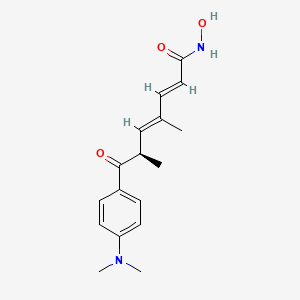trichostatin A
Trichostatin is a lipid of Polyketides (PK) class. Trichostatin is associated with abnormalities such as Dentatorubral-Pallidoluysian Atrophy, PARAGANGLIOMAS 3, abnormal fragmented structure, Disintegration (morphologic abnormality) and Hyperostosis, Diffuse Idiopathic Skeletal. The involved functions are known as Acetylation, Cell Differentiation process, histone modification, Gene Silencing and Transcriptional Activation. Trichostatin often locates in CD41a, Hematopoietic System, Chromatin Structure, Blood and Endothelium. The associated genes with Trichostatin are SPI1 gene, CELL Gene, Chromatin, CXCR4 gene and DNMT1 gene. The related lipids are Butyrates, Promega, butyrate, Lipopolysaccharides and Steroids. The related experimental models are Knock-out, Mouse Model, Xenograft Model and Cancer Model.
References related to genes published in Cancer Res.
| PMID | Journal | Published Date | Author | Title |
|---|---|---|---|---|
| 10969818 | Cancer Res. | 2000 | Maecker HL et al. | p53 promotes selection for Fas-mediated apoptotic resistance. |
| 14695212 | Cancer Res. | 2003 | Terui T et al. | Induction of PIG3 and NOXA through acetylation of p53 at 320 and 373 lysine residues as a mechanism for apoptotic cell death by histone deacetylase inhibitors. |
| 21502403 | Cancer Res. | 2011 | Kretzner L et al. | Combining histone deacetylase inhibitor vorinostat with aurora kinase inhibitors enhances lymphoma cell killing with repression of c-Myc, hTERT, and microRNA levels. |
| 19752087 | Cancer Res. | 2009 | Wang X et al. | Correction of the abnormal trafficking of primary myelofibrosis CD34+ cells by treatment with chromatin-modifying agents. |
| 19549897 | Cancer Res. | 2009 | Hsu PY et al. | Xenoestrogen-induced epigenetic repression of microRNA-9-3 in breast epithelial cells. |
| 20332239 | Cancer Res. | 2010 | Majid S et al. | Regulation of minichromosome maintenance gene family by microRNA-1296 and genistein in prostate cancer. |
| 20587525 | Cancer Res. | 2010 | Luo W et al. | Epigenetic regulation of vitamin D 24-hydroxylase/CYP24A1 in human prostate cancer. |
| 17332356 | Cancer Res. | 2007 | Stiehl DP et al. | Histone deacetylase inhibitors synergize p300 autoacetylation that regulates its transactivation activity and complex formation. |
| 18172295 | Cancer Res. | 2008 | Heller G et al. | Genome-wide transcriptional response to 5-aza-2'-deoxycytidine and trichostatin a in multiple myeloma cells. |
| 15805278 | Cancer Res. | 2005 | Kumakura S et al. | Reversible conversion of immortal human cells from telomerase-positive to telomerase-negative cells. |
| 15781621 | Cancer Res. | 2005 | Nishigaki M et al. | Discovery of aberrant expression of R-RAS by cancer-linked DNA hypomethylation in gastric cancer using microarrays. |
| 15781649 | Cancer Res. | 2005 | Bai J et al. | Predominant Bcl-XL knockdown disables antiapoptotic mechanisms: tumor necrosis factor-related apoptosis-inducing ligand-based triple chemotherapy overcomes chemoresistance in pancreatic cancer cells in vitro. |
| 15781658 | Cancer Res. | 2005 | Rahmani M et al. | Coadministration of histone deacetylase inhibitors and perifosine synergistically induces apoptosis in human leukemia cells through Akt and ERK1/2 inactivation and the generation of ceramide and reactive oxygen species. |
| 15753377 | Cancer Res. | 2005 | Mori T et al. | Epigenetic up-regulation of C-C chemokine receptor 7 and C-X-C chemokine receptor 4 expression in melanoma cells. |
| 16322213 | Cancer Res. | 2005 | Wei M et al. | BRCA1 promoter methylation in sporadic breast cancer is associated with reduced BRCA1 copy number and chromosome 17 aneusomy. |
| 16357148 | Cancer Res. | 2005 | Noh EJ et al. | Methyl CpG-binding domain protein 3 mediates cancer-selective cytotoxicity by histone deacetylase inhibitors via differential transcriptional reprogramming in lung cancer cells. |
| 16103091 | Cancer Res. | 2005 | Blagosklonny MV et al. | Depletion of mutant p53 and cytotoxicity of histone deacetylase inhibitors. |
| 15899819 | Cancer Res. | 2005 | Ho WC et al. | Nuclear factor-kappaB induced by doxorubicin is deficient in phosphorylation and acetylation and represses nuclear factor-kappaB-dependent transcription in cancer cells. |
| 15899836 | Cancer Res. | 2005 | Tran T et al. | Enhancement of folate receptor alpha expression in tumor cells through the glucocorticoid receptor: a promising means to improved tumor detection and targeting. |
| 17018599 | Cancer Res. | 2006 | Zhao LY et al. | An EBF3-mediated transcriptional program that induces cell cycle arrest and apoptosis. |
| 16818622 | Cancer Res. | 2006 | Lau QC et al. | RUNX3 is frequently inactivated by dual mechanisms of protein mislocalization and promoter hypermethylation in breast cancer. |
| 16778215 | Cancer Res. | 2006 | Sharma D et al. | Restoration of tamoxifen sensitivity in estrogen receptor-negative breast cancer cells: tamoxifen-bound reactivated ER recruits distinctive corepressor complexes. |
| 16740727 | Cancer Res. | 2006 | Qi H and Ratnam M | Synergistic induction of folate receptor beta by all-trans retinoic acid and histone deacetylase inhibitors in acute myelogenous leukemia cells: mechanism and utility in enhancing selective growth inhibition by antifolates. |
| 16707423 | Cancer Res. | 2006 | Ibanez de Caceres I et al. | Identification of novel target genes by an epigenetic reactivation screen of renal cancer. |
| 18757430 | Cancer Res. | 2008 | Kim M et al. | LRRC3B, encoding a leucine-rich repeat-containing protein, is a putative tumor suppressor gene in gastric cancer. |
| 22258452 | Cancer Res. | 2012 | Shah S et al. | Targeting pioneering factor and hormone receptor cooperative pathways to suppress tumor progression. |
